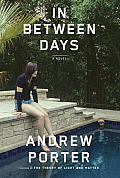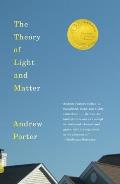
Today I wanted to talk about a question that people have been asking me ever since they learned that my novel,
In Between Days, would be coming out this fall. Invariably, after learning of the novel's existence, someone will ask, "Was it difficult?"
"Was what difficult?" I'll say.
"Writing a novel," they'll say. "You know, compared to your first book?"
It's a natural question, I suppose, and also an understandable one given the fact that I've spent the majority of my writing life focusing on short stories and am largely known as a short-story writer. Still, it's a question that always seems to catch me off guard and one that I'm not always sure how to answer.
What I can tell you is this: the circumstances surrounding the writing of these two books were very, very different. With my short-story collection, The Theory of Light and Matter, there was no deadline, no promise of eventual publication, and during certain periods of time, no interest or hope. I wrote the stories in that book with the blind faith that someday someone would want to publish them. Every once in a while there would be a small hint that this might actually happen, but just as often there would be a reminder of how difficult — some might even say impossible — it was to publish a short-story collection these days. I wrote those stories slowly and carefully over the course of about 10 years, struggling along financially and facing a lot of emotional setbacks, so that when the book did eventually come out, when I finally held it in my hands, it felt a little like I was holding my first child, a physical reminder of all those years of struggling.
With my novel, however, the circumstances were very different. I was no longer an outsider hoping to get a book contract; I was now a published author with one book under his belt and another on the way. I also had a support system of people around me who had already committed to the publication of this book. I had an editor who I could turn to for advice and guidance, an agent who was already thinking ahead to the book's publication, and even some foreign publishers who had purchased the rights to this book before I'd finished it. All of which is to say that the frequent bouts of self-doubt and fear that had burdened me in my early 20s were no longer as frequent. I wasn't questioning the path that I had chosen or wondering whether or not I would ever publish a book; I was simply focusing on the novel itself and on trying to make it the best book I could. Perhaps more importantly, I'd also reached a level of stability in my own life. Gone were the days of living in dilapidated apartment complexes, moving to different parts of the country every six months, begging my parents for money so that I could pay rent, and hustling part-time teaching work wherever I could find it. By the time I had started my second book, I had been living in San Antonio for almost seven years; I had a tenured teaching position at Trinity University (where I still teach), a wife, a house, a dog, and a daughter on the way. I had become, in many ways, the type of responsible adult that I never could have imagined myself becoming when I was first starting out.
 So, was writing my novel harder than writing my collection of short stories? Implicit in this question is the assumption that writing a novel is probably always a little harder for a short-story writer than it is for someone who has grown up with the form, and perhaps this is true. There were certainly a lot of technical challenges I had never faced before — working with such a large cast of characters, telling a story through multiple perspectives, managing a limited omniscient point of view, sustaining narrative tension for over 300 pages, and of course, the most obvious challenge of moving forward blindly with the faith that this enormous story was actually going somewhere. All of these things were very new to me and at times very daunting. But, at the same time, when I consider the word "difficult," at least as it pertains to my own life, I don't think about the last three or four years of my life. I think about all of the years that came before, the decade or so when I was living day to day, wondering how I was going to make my next month's rent payment.
So, was writing my novel harder than writing my collection of short stories? Implicit in this question is the assumption that writing a novel is probably always a little harder for a short-story writer than it is for someone who has grown up with the form, and perhaps this is true. There were certainly a lot of technical challenges I had never faced before — working with such a large cast of characters, telling a story through multiple perspectives, managing a limited omniscient point of view, sustaining narrative tension for over 300 pages, and of course, the most obvious challenge of moving forward blindly with the faith that this enormous story was actually going somewhere. All of these things were very new to me and at times very daunting. But, at the same time, when I consider the word "difficult," at least as it pertains to my own life, I don't think about the last three or four years of my life. I think about all of the years that came before, the decade or so when I was living day to day, wondering how I was going to make my next month's rent payment.
I guess what I'm saying is that this time around I had some advantages I had never had before: stability and confidence and the support of many interested parties around me. I was able to wake up each day and write with the knowledge that the words I was writing would very likely make their way into print. I don't know that the day-to-day challenges of writing fiction were any easier; I only know that the process itself was much more pleasant. I was able to have a routine. I was able to write in the same place every day at the same time. And I was able to go to bed each night with the knowledge that I had been productive that day.
Of course, I realize that this might make the process of writing a novel sound a little ordinary, maybe even mundane. But I can tell you this: as someone who has done more than his fair share of struggling, it's far, far better when the struggles in your life are taking place on the page, when the conflict and heartbreak and discouragement are your characters' and not your own.